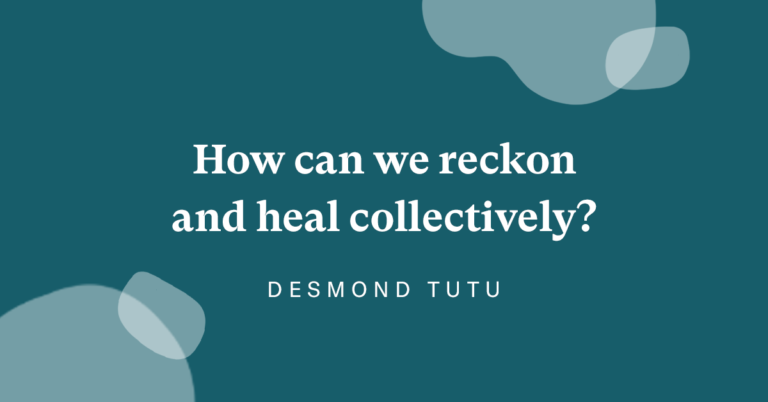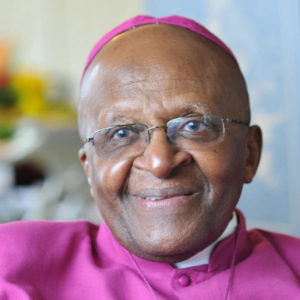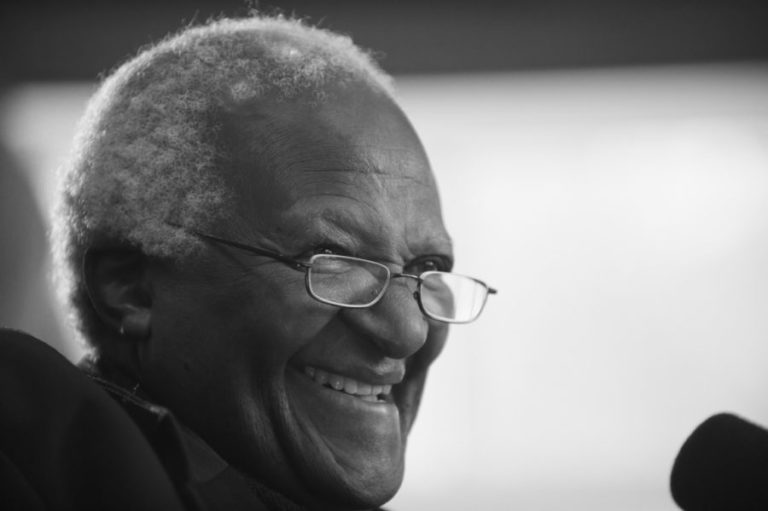Desmond Tutu
Healing Through Story
Archbishop Desmond Tutu is one of our wisest models on the territory of reckoning with past wrongs that infuse and haunt the present. In the 1990s, he helped galvanize South Africa’s peaceful transition to democracy after decades of white supremacy as the law of the land. He tells a story of how healing and human redemption unfold from his time chairing the Truth and Reconciliation Commission, which granted amnesty to those who would fully confess their crimes. “Human beings can leave you speechless, really. They can leave you speechless by the horrible things they do, but they also leave you speechless with the incredible things,” he says.

© All Rights Reserved.
Guest

Desmond Tutu was an Anglican archbishop emeritus of Cape Town, South Africa and recipient of the Nobel Peace Prize. He has written numerous books for adults and children — including The Rainbow People of God, No Future without Forgiveness, Made for Goodness, and, together with his good friend the Dalai Lama, The Book of Joy.
Transcript
[music: “Sun Will Set” by Zoë Keating]
Krista Tippett, host: I’ve had hundreds of big conversations, and my conversation partners share wisdom I carry with me wherever I go. Archbishop Desmond Tutu is one of our wisest models on the territory of reckoning with wrongs from the past that infuse and haunt the present. In the 1990s, he helped galvanize South Africa’s peaceful transition to democracy after decades of white supremacy as the law of the land. He chaired the Truth and Reconciliation Commission, or TRC. Its basic premise was that any person was eligible for amnesty if they would fully confess their crimes. Archbishop Tutu knew that saying “I’m sorry” is one of the hardest things for human beings to do, and he did not expect the human redemption that would surface on this stage.
This is Becoming Wise. I’m Krista Tippett.
Ms. Tippett: What did you learn about why, as you said, one of the hardest things for human beings to do is to say, “I’m sorry.” I mean, what did you learn about forgiveness three-dimensionally that you didn’t know before?
Archbishop Desmond Tutu: One was that I was amazed, first of all, at how powerful an instrument it is being able to tell your story. You could see in the number of people who for so long had been sort of just anonymous, faceless non-entities just being given the opportunity did something to rehabilitate them.
But it actually was a healing thing. We had a black young man who had been blinded by police action in his township, and he came to tell his story. When he finished, one of the TRC panel asked him, “Hey, how do you feel?” And a broad smile broke over his face. He was still blind, but he said, “You have given me back my eyes.” You felt so humbled that people could feel that that was how the healing, for him, would have taken place.
One of the things that constantly amazed us was the remarkable magnanimity of people. All people, black, white, Africans, and Americans. Human beings can leave you speechless, really. They can leave you speechless by the horrible things they do, but they also leave you speechless with the incredible things. We saw so many times people who ought to have been bristling with bitterness and anger, when they meet the perpetrator, actually being able to embrace. And you were asking about the difficulty. Yes, it is difficult. When we started, we looked at the legislation, and the legislation did not require a perpetrator who applied for amnesty to express even remorse. We were very upset and said, “Why not say they’ve got to say sorry or something?” But we discovered, I mean, that actually the legislators were a lot smarter. Because had they insisted that it was a condition to get amnesty, each time somebody said, “I am sorry. I am very sorry,” we would’ve said, “Ah, he’s just putting that on.”
As it happened, despite the fact that it was not a requirement, when people were applying for amnesty, almost always they would turn to the victims or the survivors or the family if the person who had been killed, and they would turn to them and say, “Please. We know it’s very difficult but please forgive.” And, as I say, almost always the victims would.
[music: “Sun Will Set” by Zoë Keating]
Ms. Tippett: Archbishop Desmond Tutu was awarded the Nobel Peace Prize in 1984. He has written numerous books for adults and children — including The Rainbow People of God and, together with his good friend the Dalai Lama, The Book of Joy.
Becoming Wise is produced by Marie Sambilay, Lily Percy, and Chris Heagle at On Being Studios, which is located on Dakota land. And our theme music is provided and composed by Zoë Keating.






